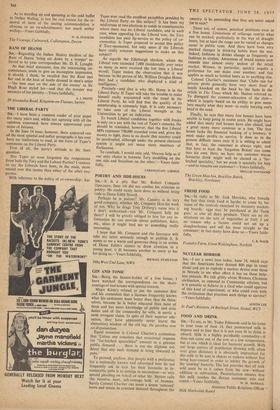GIN AND TONIC SIR,—Being the licence-holder of a free house,
I have watched the correspondence on the short- comings of tied houses with special interest.
Major Klein's refusal to put the customer first and his contention that a licensee frequently knows what his ,customers want better than they do them- selves, because he is better educated than most of them and has more knowledge of public and civic duties and of the commodity he sells, is surely a most arrogant claim. In spite of their superior edu- cation, they have apparently never learnt the elementary wisdom of the old tag, De gustibus non est disputandutn.
Equal nonsense is Colonel Charlier's contention that 'Unless one considers that occasional requests for "far-fetched specialities" amount to a genuine public demand . . . there is not the slightest evi- dence that any such demand is being thwarted in pubs.'
To pretend, anyhow, that people with a preference for a nationally known and advertised beer do not frequently ask in vain for their favourite in in- numerable pubs is to indulge in moonshine—or very special pleading on behalf of what Mr. Hutton calls 'the massive, inert, sub-average bulk' of brewers. Surely Colonel Charlier can name a dozen 'national' beers and stouts in constant demand throughout the country. Is he pretending that they are never asked for in vain?
There are, of course, practical problems even in a free house. Limitations of cellarage restrict what can be stocked, particularly in the way of draught beers; but at least the range can be varied as changes occur in public taste. And there have been very marked changes in drinking habits since the war. Indeed, fashions in drinks change as frequently as fashions in clothes. Awareness of brand names now extends into almost every section of the retail market. Women, in particular, quickly acquire a preference for one make over another; and this applies as much to bottled beers as to anything else.
Colonel Charlier's statement that 'Clubs run for private profit generally have very short lives' is neatly knocked on the head by the facts in the article in The Times which Mr. Hutton referred to. To disregard the counter-attraction of the club— which is largely based on its ability to give mem- bers exactly what they want—is really burying one's head in the sand.
Finally, he says that many free houses have been unable to keep going in recent years. He might have added that many tied houses have also closed, and a great many more continue at a loss. The free house lacks the financial backing of a brewery; it must make profits to survive, It does so in the present difficult times only if it is willing to admit that, in fact, the customer is always right, and that here at least the 'forgotten Briton' can come, into his own. Here, we have one customer whose favourite drink might well be classed as a 'far- fetched speciality,' but we stock it specially for him —and he remains our customer!—Yours faithfully,
PHYLLIS TOWNSEND
The Green Man Inn, Brackley Hatch, Brackley, Northants


































 Previous page
Previous page